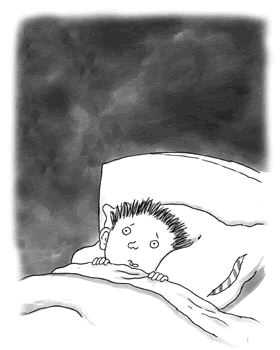ASPS and DSPS

Father, daughter can only dream of sleeping through the night
By Keith Oppenheim
LIBERTY, Missouri (CNN) -- It is 5:45 a.m. I am sleeping in a rented Ford Expedition, outside a grocery story in Liberty, Missouri. My producer David Steck and photojournalist Dominic Swann are inside, following our subjects Clay McQuerry and his 16-year-old daughter Bethany. Clay and Bethany are shopping for breakfast, alert and chipper.
"We normally come early like this," Clay tells the cashier. "This our best time of the day."
As I snore in the back seat, Clay and Bethany have already been up for two hours. They have a condition called Advanced Sleep Phase Syndrome, or A.S.P.S. Doctors say it's a genetic condition where the body clocks are moved forward -- in their case by about three hours.
"I'll fall asleep on the couch about 6:30 to 7:30," says Bethany. "I'll wake up around 3:30 to 4:30."
And her dad is the same way. Both of them have had this pattern since birth. Interestingly, Clay's wife, Janel, and his son, Casey, don't have the genetic trait. They sleep at conventional times.
Sleep disorder experts at Northwestern University in Chicago, Illinois, explain to me that the human brain has what's called a circadian rhythm, something of an internal clock in the brain. That clock can be altered by the light of day, physical activity, hormones and heredity. In fact, there are a number of sleep disorders where the circadian rhythm is off. A more common condition, Delayed Sleep Phase Syndrome, is often the most disruptive, because folks who go to bed late, may get to work late.
But Clay and Bethany have adapted so well to A.S.P.S, they hardly perceive their disorder -- as a disorder. It's more like a routine. Without being too intrusive, we wanted to see it for ourselves. So we lent the McQuerrys a video camera to document what happens during a typical night.
Dirty little secret -- we kept them up late. They hit the hay at the shocking hour of 8 o'clock. And they woke up late too -- 4:16 a.m. for Clay, 4:37 a.m. for Bethany.
Still, on a curtailed schedule, they got a lot done.
Clay read the Bible, and wrote sermons for a church where he pastors on weekends. Bethany meditated, and finished homework. At 5:07 a.m., Clay got a few minutes on the treadmill, then whipped up some pancake batter. Bethany put away last night's dishes. Then it was off to the Hy-Vee grocery store, where yours truly couldn't wake up.
At 6:45 a.m., Clay went to work at a company that manages employee benefits. Bethany ate breakfast with her brother and mom, and was then driven to school. Typically, by the time she's playing flute in first period band, she's already been up for three to four hours.
"Basically, if you look at it," said Clay, "we've had two hours of quality time -- as a father and daughter every day for 16 years."
As much as Clay and Bethany like the benefits of more time in the morning, there are downsides. Clay has to take caffeine so he won't fall asleep behind the wheel at night. Bethany misses out on evening events.
"I'd like to have a treatment to be able to stay up a little later," Bethany said.
This summer, the two of them will go to Northwestern to take part in research on sleep disorders. For Clay, it will be four days of testing and snoozing in a sleep lab. A lot about sleep disorders still isn't fully understood. Clay hopes, by taking part, he'll be able to answer some of his questions.
"I'd like to find out if they know the source of our sleep patterns," he said. "And what's causing it to be different, ya know, why we are different than other people."

0 Comments:
Post a Comment
<< Home